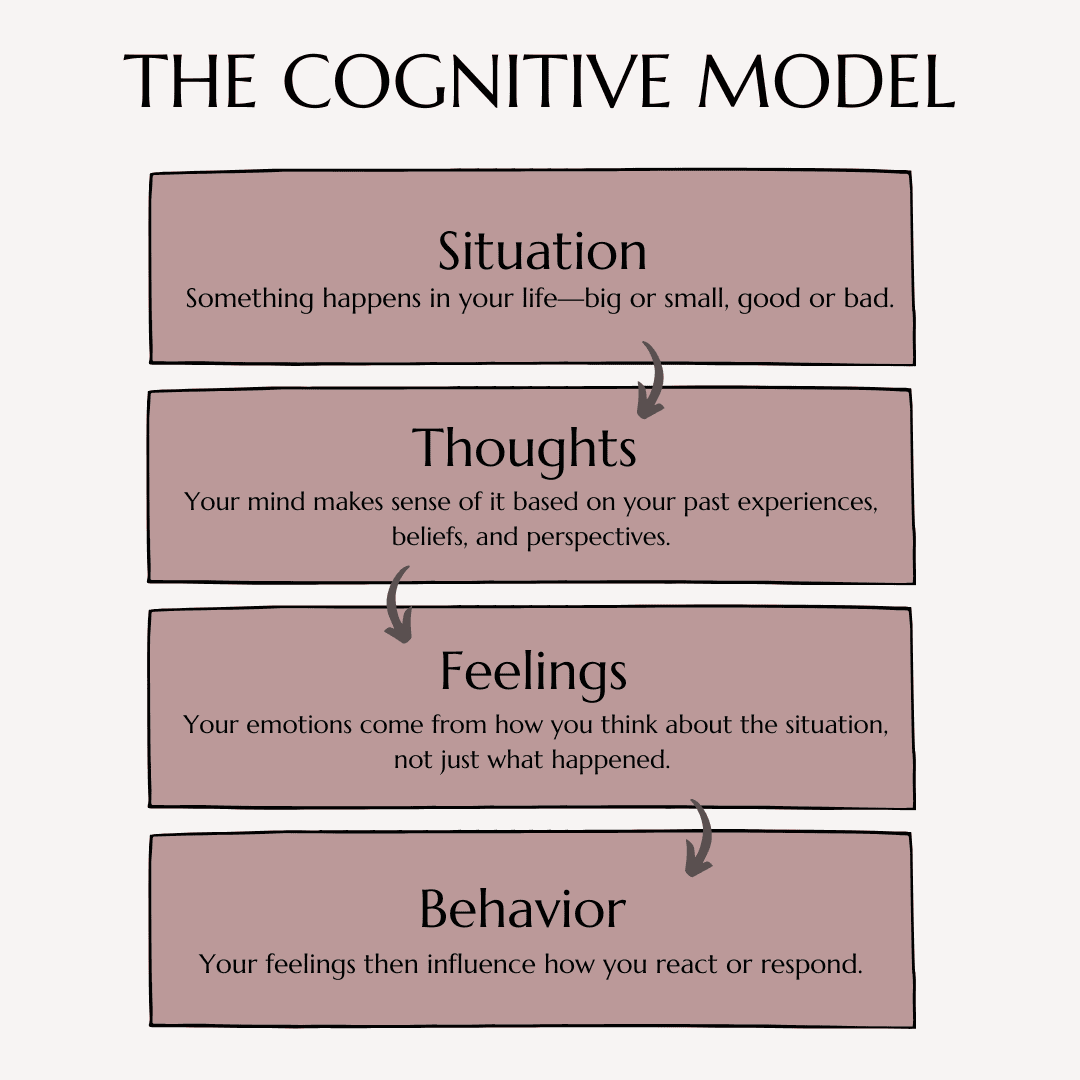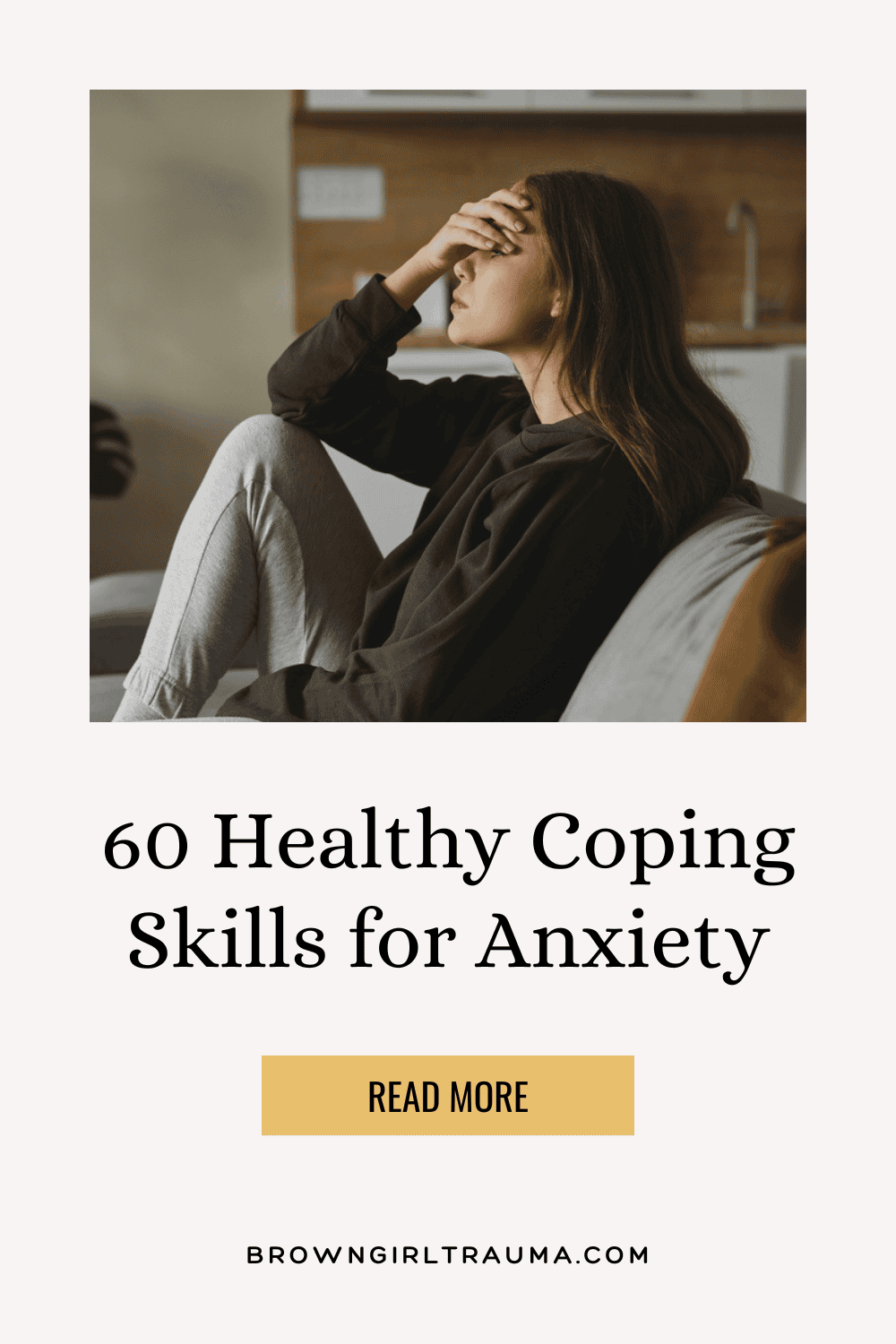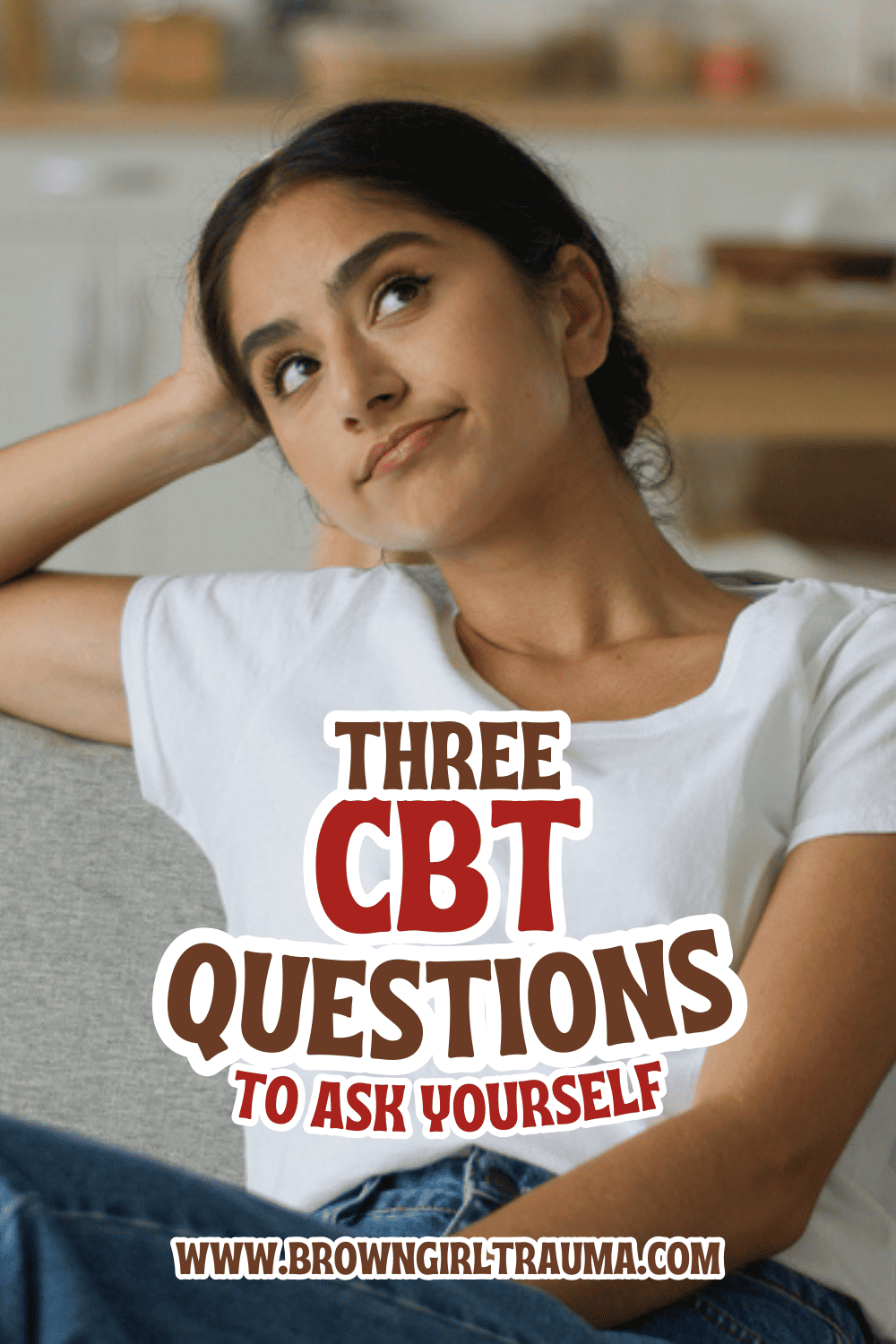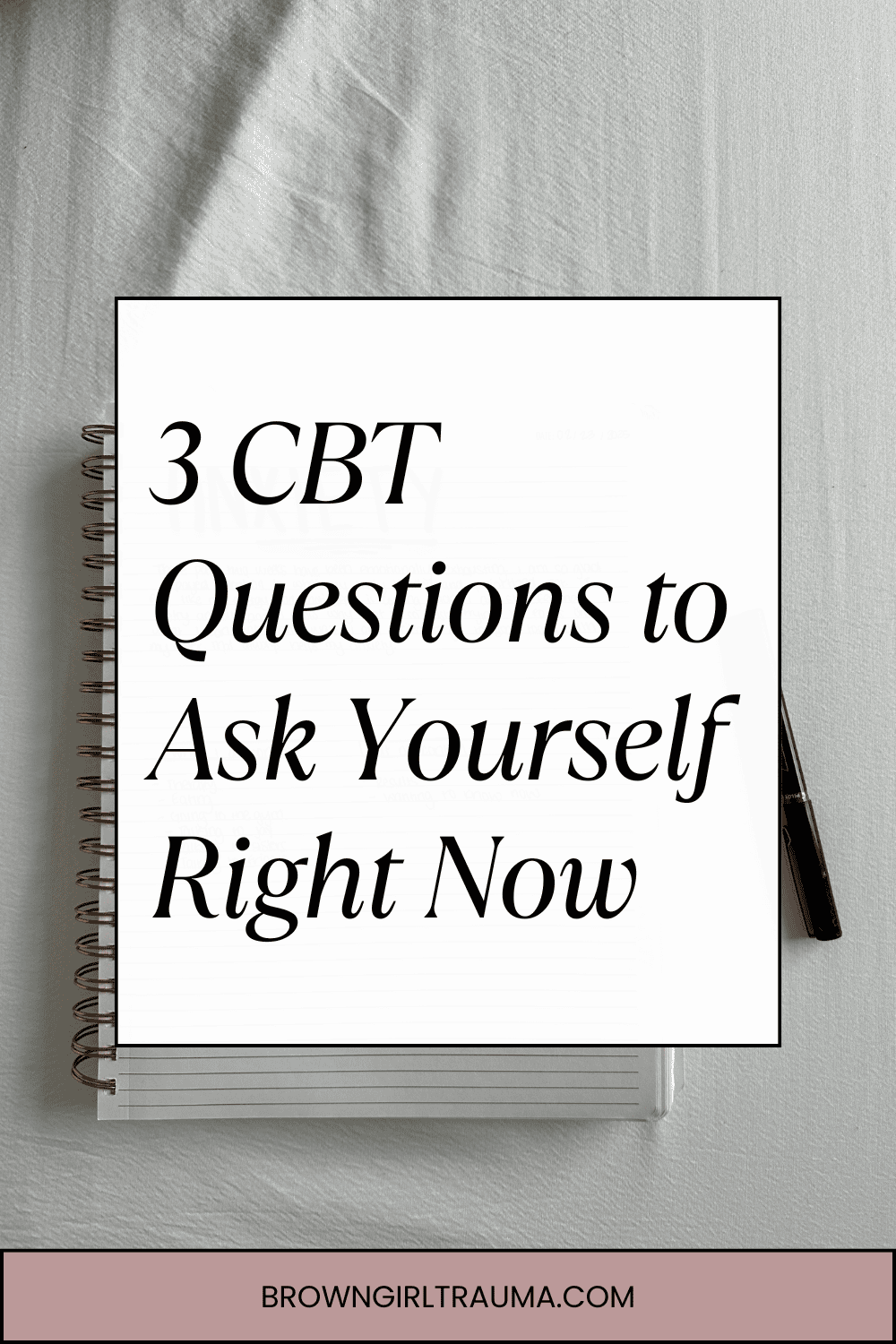Feeling Anxious? 3 CBT Questions to Ask Yourself Right Now (+ Free Worksheet!)
We've all been there—the racing thoughts, the shallow breathing, the tightness in your chest, the way your mind jumps to the most catastrophic thoughts, making it hard to remember that not every thought is a fact. I've been there more times than I can count, and I am guessing if you're reading this, you have, too. If you're struggling with anxious thoughts, keep reading to learn about the 3 CBT questions to challenge thoughts.
3 CBT Questions to ask yourself:
1. What am I telling myself right now?
2. What evidence do I have that this thought is true?
3. Is there an alternative explanation?
In today's world, feeling anxious is inevitable. We're constantly exposed to things like the news, notifications, work stress, expectations of being available 24/7, hustle culture, and daily life stressors- It is a lot. Our brain runs on high alert, and if you don't have healthy ways of dealing with your anxiety, it can feel really overwhelming.
But you don't have to stay stuck in these anxiety loops. Learning how to deal with your thoughts and emotions can help shift how you're feeling by slowing down and creating some space between you and your anxious thoughts.
If you're reading this, I assume you're looking for ways to break your old patterns and handle anxiety differently. So, the next time you catch yourself stuck in a ruminative anxious loop, ask yourself these 3 questions. You'll be surprised once you realize how much control you actually have in these situations.
What is CBT?
As a therapist, I often see how my clients' thoughts really shape their feelings and influence their behaviors. When thoughts constantly lean towards worst-case scenarios without questioning their validity, it makes sense why they would feel stuck or anxious. That's where CBT comes in to help you ask thought challenging questions.
Cognitive Behavioral Therapy, more commonly called CBT, is a popular form of talk therapy. The goal is to be able to notice your unhelpful thoughts and how they affect your actions. You learn to challenge your thoughts to help yourself before an anxious spiral takes over by adopting healthier thinking patterns.
The cognitive model below explains how thoughts, feelings, and behaviors are connected. How you interpret a situation will determine how you feel and respond.
For example, let's say I am waiting for my friends to show up at a party and I am standing alone for a few minutes. My brain might jump to anxious thoughts like, 'People probably think I am weird' or 'What if people think I don't have any friends.' These thoughts will trigger emotional distress like anxiety, fear, or sadness, which will influence my actions like wanting to wait in the car or use alcohol to cope with my emotions.
BUT if you can identify these thoughts and ask yourself these 3 CBT questions for anxiety, you have an opportunity to change how you think and respond differently. I really like working with CBT because it is so practical and provides clients with tools they can actually use at the moment.
The core components of CBT include:
- Noticing automatic thoughts that fuel your anxiety.
- Questioning the validity of your thoughts.
- Understanding your deeper beliefs (core beliefs).
- Changing actions and reinforcing healthier ways of thinking.
- Practicing simple, practical strategies to handle anxiety at the moment.

Getting to Know Your Anxiety
When dealing with anxiety, it can sometimes feel like it's all in your head, but that's not the case. Anxiety is a full-body experience that has a pretty clear cycle. Once that cycle starts, it can feed itself, making things feel even worse. But the good news is that it is a pattern, and it can be broken. Here's how it works:
When you are feeling anxious, you might notice your body kicking things off first. You will experience physiological changes within your body, like a racng heart, chest tightness, stomach flipping, shallow breathing, muscle tension, sweating, or difficulty concentrating. Think of this as your body giving you signals that there might be a danger even if there is nothing actually catastrophically wrong.
You might also notice cognitive thoughts start to race. Your brain might jump from thoughts like, 'What if this gets worse?' 'What if I can't handle it?' 'What if people never forget this about me?'? 'Something bad is going to happen?' making your mind throw more fuel on the fire and making you feel worse.
Now comes the feelings. Emotional waves of frustration, panic, helplessness, or fear can hit pretty hard, leaving you feeling like you have lost all control. You might have also noticed that the more you focus on it, the bigger and scarier it gets, almost like a snowball rolling downhill.
By now, you just want to get rid of the anxiety and feel better at all costs. Your behavioral instincts might take over. This is where avoidance behaviors can take the front lead, where you might find excuses to leave, seek out reassurance, bail on plans, isolate, etc., which might help at the moment, but because you are avoiding what is making you anxious, the anxiety is getting stronger. Kinda annoying, right?
The goal is not to get rid of the anxiety by any means but rather to face it little by little. Learning to question your thoughts, calming down your body, sitting with the discomfort, and trusting yourself that you can handle it.
Speaking from personal experience, dealing with anxiety is never easy, but the more you do it, the weaker the anxiety gets.
CBT Questions to Ask Yourself
As someone who struggles with anxiety, I know firsthand that anxiety has a very sneaky way of taking over our thoughts and emotions. It makes you feel like everything is urgent and scarier than it really is. Your brain might be jumping from worst-case scenarios without pausing to ask if that even makes sense.
If you were able to pause and question some of your thoughts, you might realize that your thoughts are just thoughts, and just because they feel real does not mean they are actually real.
But, through CBT, I have learned that taking a step back and questioning these anxious thoughts can make a massive difference in managing how you feel and making intentional choices. And honestly? It helps so much.
Here are 3 CBT questions to ask yourself when you are feeling anxious to help yourself pause:
1) What am I telling myself right now?
Your thoughts are racing when you are feeling really anxious and your mind starts running a scrip-usually one that's probably negative and not helpful.
Anxiety thrives on these automatic, unhelpful thoughts, further fueling how you are feeling. The first step in slowing down these thoughts is catching these unhelpful thoughts that are making you anxious and challenging negative thoughts.
Most of the time, you might not even realize what your thoughts are telling you unless you stop and pay attention to them. When I pause and write down the thoughts going through my head, it becomes easier to question them since now instead of just feeling anxious, I can see what's fueling it.
So, pause and ask yourself, 'What exactly am I saying to myself?' Maybe it's something like:
- I am stupid
- I am not good enough
- I am never going to get the job
- People probably think I am weird
- Everyone is laughing at me
- No one likes me
- I am a bad person
Learning to recognize these unhelpful thoughts is the first step in helping yourself manage your anxiety. Otherwise, you stay stuck in a thought loop that keeps repeating, making you feel worse.
Now that you have an idea of some of the thoughts that are making you anxious, let's question if they are actually true.

2) What evidence do I have that this thought is true?
You might have noticed that when you are feeling anxious about something, all your thoughts feel like facts. You feel like you are the only one going through it, and you want to feel better quickly and at no cost. When I feel anxious, I notice that my brain LOVES to jump to the worst possible scenario based on assumptions or exaggeration of the actual danger.
Anxiety loves to present opinions as facts and just because something feels true does not mean it always is, and thats where you search for the evidence and look at the whole picture.
Start by asking yourself, "What evidence suggests that my thoughts are completely true?" "Are my thoughts based on facts or assumptions?" and "Is there any evidence that suggests that my thoughts aren't completely true?"
For example, let's say you made a mistake at work and noticed a thought like, "I can never do anything right." The evidence that supports the thought is that you did make a mistake (anxiety is even higher if this isn't the first time you made a mistake), and the hurt you experience because of it is very real. But does the 'never' truly apply to every situation?
Are there any past experiences that might suggest you actually do get a lot right? Is your mind focusing on your worst moments and forgetting about things that did go well for you? Are you predicting what is going to happen in the future based on past experiences? If someone you cared about was having a similar thought, would you see it the same way?
The goal is not to dismiss how you are feeling or force yourself into positive thinking because your thoughts might have some truth to them (not always), but is it the whole truth? And, if there is some truth to your thoughts, ask yourself, "What's the worst that could happen, and would I survive it?" "What's the best that could happen?" "What's most likely to happen?" Gain back some control by focusing on better preparing yourself through different outcomes.
If you are able to step outside of your anxious narrative, you will see a perspective that is balanced, fair, and more realistic to what you're experiencing, taking some of the power away from your anxiety.
3) Is there an alternative explanation?
Looking for an alternative explanation is a game-changer when you're stuck in an anxious spiral because your brain is likely stuck on the most catastrophic interpretation of the situation. When you look for alternative explanations, you get to push back your challenging thoughts a little instead of letting anxiety run the show and find a more balanced perspective.
For example, let's say you made a mistake at work, and your first thought is, "I can never do anything right." Once you work through question 2 and seek out evidence that suggests why your thought is or isn't true, you can then challenge your anxious thoughts and make some room for other explanations like, "It's not true that I can never do anything right. There are plenty of things I do get right, even though I don't always notice them. Everyone makes mistakes at work, but making mistakes does not mean I fail at everything else. I am allowed to make mistakes and learn from this."
I can't tell you how many times I've misinterpreted a situation before answering this question. Working through an alternative explanation allows you to see that your first thought or reaction is not always the most accurate one.
RELATED POST: 15 Coping Skills for Anxiety You Need To Know Now
Building Your Coping Toolbox
When you are stuck in anxiety loops, the right tools can make all the difference in helping you feel better. You don't always have just to push through or distract yourself until the anxiety goes away. As a therapist, I always tell my clients that their emotions aren't good or bad; they are signals that provide you with clues about what you might need or where something feels off. You want to try and get curious about what they are trying to tell you.
When it comes to coping skills, there's no one-size-fits-all. What works for one person might not work for another, and that's okay. You want to build your own coping toolbox of skills that might help you when you're feeling anxious.
A mistake people tend to make with coping skills is reaching for them only when they are feeling overwhelmed or anxious. Because they haven't practiced using skills before, they might not be practicing them correctly or consistently.
Coping skills work best when you build them into your daily routine, not just in crisis moments. The more you practice different coping skills, the easier it is to calm your nervous system and shift your mindset.
Here are some coping strategies to try:
- Practice intentional breathing by slowing down your breath
- Write out your thoughts by journaling to help create some distance between your thoughts and emotions- thought challenging
- Shake off your anxiety by moving your body like dancing, stretching, exercising
- Practice affirmations
- Talk to someone you feel comfortable with
- Listen to calming sounds
- Use CBT questions for anxiety to challenge negative thinking
- Engage in distraction strategies like watching a funny show or coloring
When unhelpful thoughts take over, a simple thought challenge exercise will help you see things in a more balanced way, allowing you to break free from anxiety cycles.
So, the next time you notice anxiety creeping in, try these three questions and pair it with a helpful coping strategy to help manage your emotions. Remember, the more you practice, the easier it will become.
3 CBT Questions to Ask Yourself- Download FREE Worksheet!
Psst...pin this post to keep these CBT questions to challenge thoughts for your self-growth journey!
Eager for More? Here Are Some Picks!



